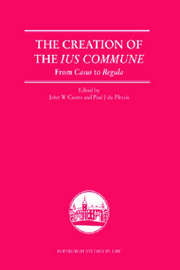Book contents
- Frontmatter
- Contents
- Preface
- List of Contributors
- List of Abbreviations
- Introduction
- 1 The Sources of Medieval Learned Law
- 2 The Infrastructure of the Early Ius Commune: The Formation of Regulae, or its Failure
- 3 Ius Quaerens Intellectum: The Method of the Medieval Civilians
- 4 Medieval Family and Marriage Law: From Actions of Status to Legal Doctrine
- 5 The Roman Concept of Ownership and the Medieval Doctrine of Dominium Utile
- 6 Succession to Fiefs: A Ius Commune Feudorum?
- 7 Towards the Medieval Law of Hypothec
- 8 The Ignorant Seller's Liability for Latent Defects: One Regula or Various Sets of Rules?
- 9 The Glossators' Monetary Law
- 10 Citations and the Construction of Procedural Law in the Ius Commune
- 11 Doctoribus bona dona danda sunt: Actions to Recover Unpaid Legal Fees
- Index
10 - Citations and the Construction of Procedural Law in the Ius Commune
Published online by Cambridge University Press: 12 September 2012
- Frontmatter
- Contents
- Preface
- List of Contributors
- List of Abbreviations
- Introduction
- 1 The Sources of Medieval Learned Law
- 2 The Infrastructure of the Early Ius Commune: The Formation of Regulae, or its Failure
- 3 Ius Quaerens Intellectum: The Method of the Medieval Civilians
- 4 Medieval Family and Marriage Law: From Actions of Status to Legal Doctrine
- 5 The Roman Concept of Ownership and the Medieval Doctrine of Dominium Utile
- 6 Succession to Fiefs: A Ius Commune Feudorum?
- 7 Towards the Medieval Law of Hypothec
- 8 The Ignorant Seller's Liability for Latent Defects: One Regula or Various Sets of Rules?
- 9 The Glossators' Monetary Law
- 10 Citations and the Construction of Procedural Law in the Ius Commune
- 11 Doctoribus bona dona danda sunt: Actions to Recover Unpaid Legal Fees
- Index
Summary
INTRODUCTION
The subject of this volume is the creation of the ius commune. It is a large subject, even an unwieldy one. Where should a student begin? A possible starting point, the one taken in this chapter, is to select a vantage point and use it to examine in detail the ways in which the law was formed. It has long seemed to me that procedural law might provide a profitable view. So I picked it as a topic, finding in subsequent investigation that it does provide a good example of some of the ways by which the mature ius commune came into being. There were other ways, no doubt, and they may provide greater insights into the process. However, this one shines a light on the nature of the work done by the medieval jurists.
This chapter concerns only one aspect of procedural law: that relating to citations, the process by which parties were summoned to appear before a court. The choice was not quite random. It was influenced by my own experiences in working through the records of the English ecclesiastical courts, some of which are the source of a brief description of court practice placed at the end of this chapter. But it was more than that. Chaucer's summoner and the disreputable reputation of the men who delivered citations in English court practice, together with the disputes about citations found in the records of litigation, were also spurs for this choice. The subject is of intrinsic interest. How law suits should be begun is a problem faced by every legal system.
Information
- Type
- Chapter
- Information
- The Creation of the Ius CommuneFrom Casus to Regula, pp. 247 - 276Publisher: Edinburgh University PressPrint publication year: 2010
